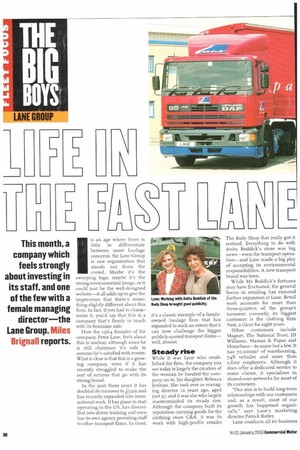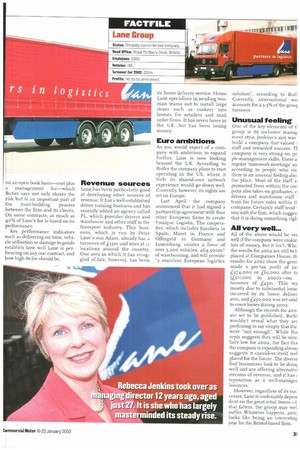This month, a company which feels strongly about investing in
Page 30

Page 31

If you've noticed an error in this article please click here to report it so we can fix it.
its staff, and one of the few with a female managing director—the Lane Group. Miles lirignall reports. n an age where there is little to differentiate between most haulage concerns, the Lane Group is one organisation that stands out from the crowd. Maybe it's the sweeping logo, maybe it's the strong environmental image, or it could just be the well-designed website—it all adds up to give the impression that there's something slightly different about this firm. In fact, if you had to characterise it, you'd say that this is a company that's firmly in touch with its feminine side.
How the 1964 founder of the company, Peter Lane, feels about this is unclear, although since he is still chairman it's safe to assume he's satisfied with events. What is clear is that this is a growing company, even if it has recently struggled to make the sort of returns that go with its strong brand.
In the past three years it has doubled its turnover to152m and has recently expanded into international work. It has plans to start operating in the US, has diversified into driver training and even has its own agency providing staff to other transport firms. In short, it's a classic example of a familyowned haulage firm that has expanded to such an extent that it can now challenge the bigger publicly-quoted transport firms— well, almost.
Steady rise
While it was Lane who established the firm, the company you see today is largely the creation of the woman he handed the company on to, his daughter Rebecca Jenkins. She took over as managing director iz years ago, aged just 27, and it was she who largely masterminded its steady rise. Although the company built its reputation carrying goods for the clothing store C&A, it was its work with high-profile retailer
The Body Shop that really got it noticed. Everything to do with Anita Roddick's store was big news—even the transport operation—and Lane made a big play of accepting its environmental responsibilities. A new transport brand was born.
While Ms Roddick's fortunes may have fluctuated, the general boom in retailing has ensured further expansion at Lane. Retail work accounts for more than three-quarters of the group's turnover: currently, its biggest customer is the clothing firm Next, a client for eight years.
Other customers include Magnet, The National Trust, JD Williams, Mamas & Papas and Homebase—to name but a few. It has 7o,000m2 of warehousing, 748 vehicles and more than 1,600 employees. Although it does offer a dedicated service to some clients, it specialises in shared-user networks for most of its customers.
"Our aim is to build long-term relationships with our customers and, as a result, most of our growth has happened organically," says Lane's marketing director Patrick Butler Lane conducts all its business
on an open book basis—cost plus a management fee—which Butler says not only shares the risk but is an important part of the trust-building process between the firm and its clients. On some contracts, as much as 40% of Lane's fee is based on its performance.
Key performance indicators such as delivering on time, vehicle utilisation or damage to goods establish how well Lane is performing on any one contract, and how high its fee should be.
Revenue sources
Lane has been particularly good at developing other sources of revenue. It has a well-established driver training business and has recently added an agency called PL, which provides drivers and warehouse and other staff to the transport industry. This business, which is run by Peter Lane's son Adam, already has a turnover of 133m and sites at ii locations around the country. One area in which it has struggled of late, however, has been its home delivery service. Home Lane specialises in sending twoman teams out to install large items such as cookers into homes for retailers and mail order firms. It has seven bases in the UK, but has been losing money.
Euro ambitions
As you would expec t of a company with ambitions to expand further, Lane is now looking beyond the UK. According to Butler the company plans to start operating in the US, where it feels its shared-user network experience would go down well. Currently, however, its sights are set on Europe.
Last April, the company announced that it had signed a partnership agreement with four other European firms to create €unique Logistix. The cooperative, which includes Eurobeta in Spain, Mazet in France and Offergeld in Germany and Luxemburg, creates a force of over 3,200 vehicles, 464,50=2 of warehousing, and will provide "a seamless European logistics
solution", according to Butl Currently, international wo accounts for 2.5-3% of the groui turnover.
Unusual feeling
One of the key elements of ti group is its inclusive manag ment style. Jenkins's aim was build a company that valued i staff and rewarded success. TI company is very strong on pe pie-management skills. There a regular 'teamwork meetings' an according to people who vis there is an unusual feeling abo the place. Most of the staff a promoted from within; the cot pany also takes on graduates, e drivers and warehouse staff train for future roles within ft company. Certainly staff tendstay with the firm, which sugges that it is doing something righ All very welL..
All of the above would be vei well if the company were makin lots of money, but it isn't. Whi: the results for 2002 are still to b placed at Companies House, th results for 2001 show the grou made a pre-tax profit of ju: £274,000 Or L61,000 after ta (L311,000 in 2000)—on turnover of f4.5m. This wa mostly due to substantial losse incurred by its home deliver arm, and 1250,000 was set asid to cover losses during 2002.
Although the records for zoo are set to be published, Sufic wouldn't reveal what they an preferring to say simply that the were "not enough". While tha reply suggests they will be simi larly low for 2002, the fact tha the company is expanding abroad suggests it considers itself we] placed for the future. The divers i fled businesses look to be doinl well and are offering alternativi streams of revenue, and it has ; reputation as a well-manage( business.
However, regardless of its sue cesses, Lane is undeniably depen dent on the great retail boom—i that falters, the group may we] suffer. Whatever happens, 200 looks like being an interestini year for the Bristol-based firm.




























































































































































